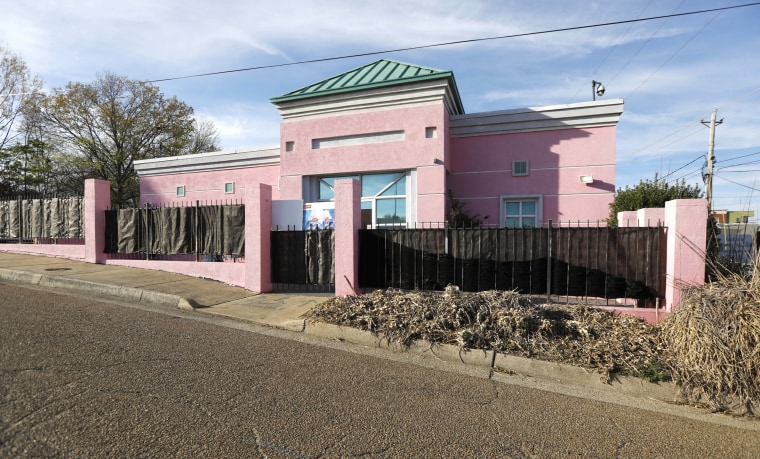JACKSON, Miss. — The building that once housed Mississippi’s last abortion clinic has sat empty for the past six months — but now it has a new owner and new plans for its future.
The former Jackson Women’s Health Organization will become a luxury consignment shop called Hunt, owner David Carpenter said this week. Carpenter purchased the pink-stucco building known as the Pink House shortly after the Supreme Court overturned Roe v. Wade. Earlier this week, crews were on site repainting its exterior white.
In an interview Wednesday, Carpenter didn’t want to discuss the past that once brought women and girls from across the South to the building seeking abortion care, along with protesters trying to dissuade them.
“I really don’t want to get into the political side of it,” he said. The business owner is in the process of relocating Hunt from its smaller space less than a mile away, with plans to open the new 3,000-square-foot store March 1.
“That was then. This is now,” he said. “I want to do something that the community will embrace. I want it to be a positive thing. I don’t want to get into a political issue about it.”
The Jackson Women’s Health Organization shut its doors July 6, after a state trigger law banning nearly all abortions took effect following the Supreme Court’s decision. Clinic owner Diane Derzis told NBC News at the time that she would open a new facility in Las Cruces, New Mexico. The Las Cruces Women’s Health Organization has been nicknamed the Pink House West in a nod to the Jackson clinic.
Carpenter said he bought the Jackson building in July from a local developer who had purchased the property from Derzis.
The Jackson Women’s Health Organization opened in 1995. By 2006, it was the only abortion provider remaining in the state.
In recent years, clinic volunteers could be seen escorting patients, some of whom had traveled hundreds of miles, past shouting protesters and graphic posters into the Pink House for a procedure that was becoming increasingly difficult to obtain as legislatures across the South sought to roll back abortion rights.
The clinic was across the street from a bustling retail and dining strip of Jackson’s Fondren neighborhood. On occasion, abortion rights opponents would yell at patrons of nearby businesses.
The once near-daily scenes of demonstrators, some with microphones and bullhorns in tow, and the clinic’s attempts to drown them out with Twisted Sister’s “We’re Not Gonna Take It” prompted the Jackson City Council to pass a noise ordinance in 2019 creating a buffer zone restricting the use of amplifiers near health care facilities. After a legal challenge from abortion opponents, the council repealed the ordinance. The clashes faded last summer when the Pink House shut its doors.
Roughly three months after the Dobbs v. Jackson Women’s Health Organization decision, 66 clinics in 15 states had stopped providing abortion services, according to the Guttmacher Institute, a research group supporting abortion rights. Twenty-six of those clinics closed their doors altogether.
When Derzis confirmed she was closing the Pink House, there were questions about what would become of the space. At an anti-abortion-rights prayer rally outside of the clinic months before it shuttered, one speaker offered that with Roe gone the building could be repurposed as a church.
Carpenter’s shop primarily sells home furnishing wares. Ornate chandeliers, seagrass-woven chairs and a $1,000 19th-century porcelain bowl are among its recent offerings listed on its Facebook page.
Carpenter declined to discuss whether the building’s past might make it the subject of unwanted attention.
“My hope and my goal is I want it to be a positive thing,” he said.

